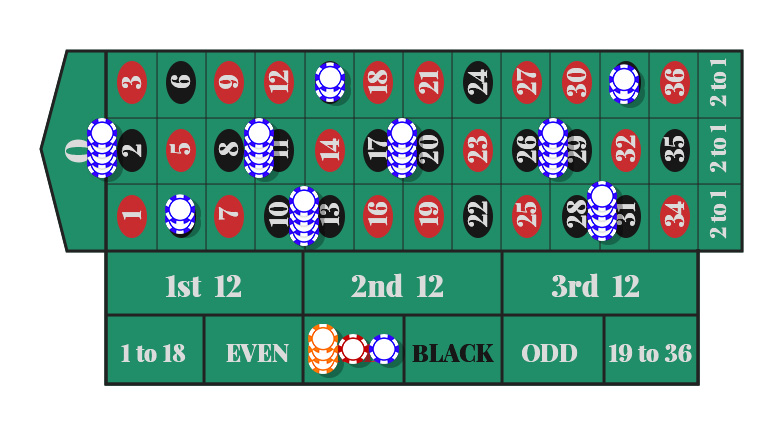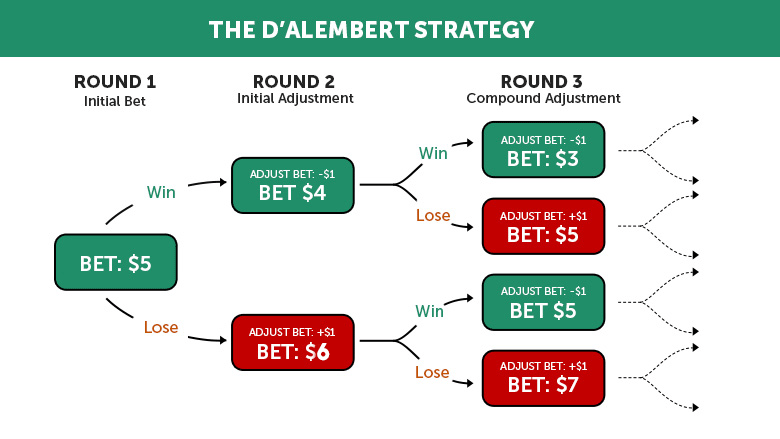- A trending approach on the internet for roulette is the 666 strategy.
- In the past I wrote how the roulette 666 strategy can be a good, but also explained why the system doesn't work sometimes,
- In this piece I will briefly explain the 666 strategy, as well as the 2 other popular strategies; the Martingale and the D’Alembert.
- We will then compare the 666 strategy to those others popular roulette strategies.
ROULETTE 666 STRATEGY
The concept of the 666 strategy is to cover almost all of the numbers on the felt with different size bets, adhering to the faulty thought that one of the numbers will always hit. The most popular variation of the 666 strategy is for the European Wheel variant and is below. The proof can be applied to any of the 3 variants of roulette, American version and the elusive French wheel.
The roulette 666 system covers all of the numbers on the table except for four. You need at least $66 per spin to use this system, but you could use multiples of $66 instead (like $132 or $198, etc.). If you did that, you’d simply multiply the betting amounts in the example below by the factor you’re using.
The roulette 666 strategy betting protocol works like this:
- You bet $36 on Red.
- You bet another $24 on the following numbers: $4 on each of the following two-number bets: 0/2, 8/11, 10/13, 17/20, 26/29, 28/31.
- You place $2 bets on any 3 single numbers that you choose from the following: 4, 6, 15, 22, 24, 33 and 35.
- This will leave only four numbers on the table that you haven’t bet on. In the image below you can see that the four numbers without any bets are: 6, 22, 24 and 35.
- What kind of results can you expect to see using this system? If one of the four numbers you didn’t bet on comes up, then you lose all of your $66 or the multiple of this that you bet.
- In all other case, the player sees a net win of $6 or the multiple of this that you bet.

THE MARTINGALE STRATEGY
The Martingale strategy is one of the most popular roulette betting strategies implemented by recreational players. This is not because it is effective, but it is such a straight forward and simplistic system to apply. The player does not have to memorize any complex equations, using physics or quickly and mentally calculate expressions.
In most cases the Martingale system is applied to games of chance that have a near 50/50 win to loss outcome, such as the Roulette black and red bets.
The traditional Martingale system simply doubles the next bet after a loss is attained. When a win is achieved the cycle begins anew. For example, when a player starts with a 1 dollar bet and loses the first bet, the next bet would be 2 dollars, and if the player loses that bet, the next bet would be four dollars. If that bet is won the cycle begins at one dollar again. This approach dictates that the player will win the largest bet of their betting cycles.
THE D'ALEMBRT STRATEGY
The D’Alembert Roulette is a system with a minimal amount of variance associated with it. You do increase your bets after a loss, but it’s at a much smaller rate than in the Martingale system. The D’Alembert approach works best when used for an even chance game. In roulette it can be can be used on Red-Black, Odd-Even and 1-18/19-36 bets.
The system works in the following way:
First you pick a starting bet, than you increase your bets by one after a loss, and decrease them by one after a win. The theory is that once you have as many wins as losses, you will be in profit by the amount of bets you’ve placed. The following example shows a betting sequence with a starting bet of 5:
Bet 5 and lose ➨ Bet 6 and lose ➨ Bet 7 and win ➨ Bet 6 and lose ➨ Bet 7 and win ➨ Bet 6 and win ➨ Bet 5 and lose ➨ Bet 6 and win
The maths for the D'Alembert strategy above is as follows: 0 – 5 – 6 + 7 – 6 + 7 + 6 – 5 + 6 = 4
COMPARING THE ROULETTE 666 TO THE MARTINGALE & THE D'ALEMBERT STRATEGIES
Each one of these systems is subject to a mathematical negative expectation. This means that over the long term the player will lose money. There are circumstances where a positive expectation can be achieved. This usually involves some type of free play coupons or promotional chips. Keeping with the ideology that each system has a negative expectation the question becomes: Under normal playing conditions which system has the slowest loss rate?
The 666 and the Martingale systems are heavily dependent on the fact that events that will be disastrous, and wipe a players bankroll out, are very rare. They are very streaky. The idea is you a win many small amounts often and only lose big dollars on rare occasions.
Conversely, the D’Alembert Roulette system results is a more linear decline in a players bankroll. The player does raise and lower their bet after a loss and win respectively, but it is not as extreme as in the Martingale systems. As in the previous systems, it is possible to flip the advantage temporarily, with the use of free play coupons and pit chips.
SUMMARY
From my experience the 666 and Martingale system are best utilized in short advantage gaming trips, no more than a few days. This is because there is a high percentage chance that the rare event will never be experienced, and the player could likely be a winning player on that trip. In trips that extend more than a few days (a week or more), the player would be best served to use the slow reduction D’Alembert system. This will ensure the players bankroll will remain intact and the player can maximize their comp value. Whatever system is used the player needs to understand that over the long term, and without the use of promotional chips, bonus or coupons the player is playing a negative game.


